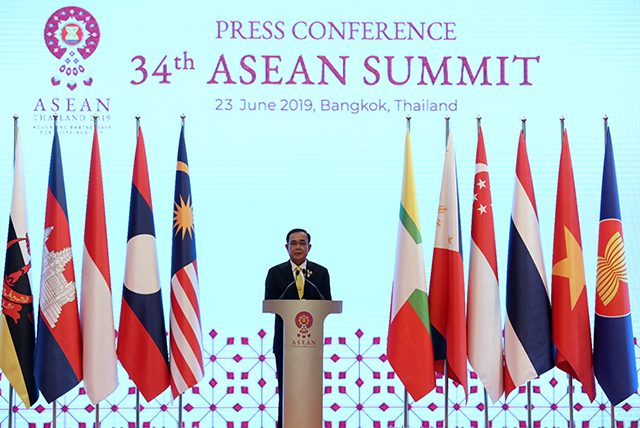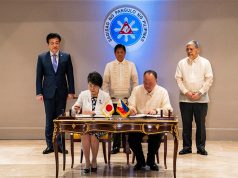
BANGKOK — Southeast Asian leaders agreed on Sunday to work together on the region’s economy and security to strengthen their position to face growing U.S.-China tensions, as they wrapped up their summit in Bangkok.
The 10-member Association of Southeast Asian Nations (ASEAN) will need its collective economic strength for bargaining power globally, especially amid the trade tensions between the world’s top two economies, Thai Prime Minister Prayuth Chan-ocha told a news conference, as chairman of the 34th ASEAN Summit.
Prayuth urged ASEAN nations to complete negotiations this year for the China-initiated Regional Comprehensive Economic Partnership (RCEP) pact that includes 16 countries but has been held up by disputes between China and India over access to markets and protected lists of goods.
Negotiations began in 2012 on RCEP, which envisages the creation of a free trade zone encompassing 45% of the world’s population and more than a third of its GDP, but does not involve the United States.
“This will help ASEAN handle the changes and uncertainty that will happen in the region going forward, particularly the impacts of trade tension between ASEAN’s important trade partners,” Prayuth said.
First proposed by China, RCEP’s 16 signatories comprise the 10 ASEAN member states and six Asia-Pacific countries, including major economies China, India, Japan and South Korea. ASEAN has existing free-trade agreements with all six countries.
“If we can do this, we will have the bargaining power and base for negotiation. Because when combined, we are 650 million people, the largest regional bloc in the world,” the Thai prime minister said of ASEAN.
Singaporean Prime Minister Lee Hsien Loong told reporters that ASEAN “must expect some fallout” from the U.S.-China trade war, pointing to Singapore’s already slowing economy this year.
Four ASEAN countries — Thailand, Indonesia, Singapore and Vietnam — will discuss the trade war in next week’s G20 summit, which assembles 20 major economies, in Tokyo, Prayuth said. Thailand will host the next ASEAN summit in November.
ASEAN members also agreed on a common approach on a U.S.-led Indo-Pacific initiative on Sunday, at a time when U.S.-China tensions are rising and forcing ASEAN countries to take sides.
Prayuth hailed the bloc’s agreement on the ASEAN Outlook on the Indo-Pacific as a “significant step,” as it will help guide cooperation in the region in an increasingly polarised geopolitical landscape.
The outlook, seen by Reuters, is aimed at “helping to promote an enabling environment for peace, stability and prosperity in the region in addressing common challenges”.
South China Sea
The chairman’s statement, released later on Sunday, called for a de-escalation of tension in the South China Sea.
The South China Sea is one of the world’s busiest waterways, and a potential flashpoint in the region as several ASEAN members — the Philippines, Vietnam, Malaysia, Brunei and Indonesia — as well as China and Taiwan have conflicting territorial claims.
“We emphasized the importance of non-militarization and self-restraint in the conduct of all activities by claimants and all other states … that could further complicate the situation and escalate tensions in the South China Sea,” the statement said, without naming China but referring instead to its militarization of islands and islets.
The statement also said a first reading of a Code of Conduct negotiating draft for the disputed South China Sea would likely be finished by this year. Thailand has said the final reading could be expected by the end of 2021.
“There are some issues in the COC which are going to be very difficult to work out – in their nature they are going to be contentious,” Singapore’s Lee said. “I think the vital interests will not be easy to reconcile.”
The chairman’s statement also said ASEAN supported the repatriation process of Myanmar’s fleeing Rohingyas, but stopped short of condemning Myanmar.
Rights groups have called on ASEAN to rethink support for plans to repatriate Rohingya Muslims who have fled member state Myanmar, where activists say returnees could face discrimination and persecution.
More than 700,000 Rohingya crossed into Bangladesh in 2017, according to U.N. agencies, after a crackdown by Myanmar’s military sparked by Rohingya insurgent attacks on security forces.
Formed more than 50 years ago, ASEAN has historically struggled with challenges facing the region because it works only by consensus and is reluctant to become involved in any matter regarded as internal to a member state.
“(We) expressed our continued support for Myanmar’s commitment to … facilitate the voluntary return of displaced persons in a safe, secure and dignified manner,” the statement said, not calling the Rohingya by name.
ASEAN also expected a commission created by Myanmar’s government to seek accountability through “an independent and impartial investigation into alleged human rights violations and related issues”.
The statement, however, proved rather weak in the face of a call on Saturday by Malaysia’s foreign minister Saifuddin Abdullah to bring the perpetrators of massacres and atrocities against the Rohingya to justice and to “include the citizenship of the Rohingyas” in the repatriation process.
“Developments in Myanmar … (are) providing a litmus test for ASEAN’s capacity to manage developments in one of its member states that have wider ramifications for the region and, indeed, beyond,” Marty Natalegawa, a former Indonesian foreign minister, told Reuters.—Reporting by Patpicha Tanakasempipat and Panu Wongcha-um; Additional reporting by John Geddie; Editing by Kay Johnson and Alison Williams









